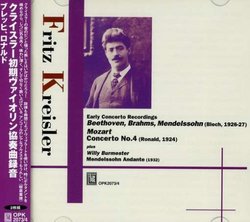| All Artists: Ludwig van Beethoven, Johannes Brahms, Felix [1] Mendelssohn, Wolfgang Amadeus Mozart, Landon Ronald, Leo Blech, Berliner Staatskapelle, Royal Albert Hall Orchestra, Staatskapelle Berlin Title: Early Concerto Recordings of Fritz Kreisler Members Wishing: 0 Total Copies: 0 Label: Opus Kura Original Release Date: 1/1/2008 Re-Release Date: 6/17/2008 Genre: Classical Styles: Chamber Music, Forms & Genres, Concertos, Historical Periods, Classical (c.1770-1830), Modern, 20th, & 21st Century, Instruments, Strings Number of Discs: 2 SwapaCD Credits: 2 UPCs: 034061720737, 4582158680731 |
Search - Ludwig van Beethoven, Johannes Brahms, Felix [1] Mendelssohn :: Early Concerto Recordings of Fritz Kreisler
 | Ludwig van Beethoven, Johannes Brahms, Felix [1] Mendelssohn Early Concerto Recordings of Fritz Kreisler Genre: Classical
|
Larger Image |
CD Details |
CD ReviewsWhy aren't more of Kreisler's recordings available? Harald Anderson | Washington, DC United States | 05/09/2009 (5 out of 5 stars) "For anyone who is a fan of Kreisler, these CDs (this is a two-CD set) and the others in the series are a must-have. Too few of Kreisler's recordings are available on CD, and this set leaves no questions about his technical skills and his influence on the 20th century interpretation of several classics.
That said, these recordings may be very difficult for some listeners to work their way through. The engineers selected from various pressings - American, German, and Japanese - to find what they considered the truest. I have most of the 78s transfered here (but not the same pressings) and can vouch that the transfers are good. However, owing to the age of the originals, there is an awful lot of background noise, sometimes increasing in the middle of a side (suggesting to me that they used several masters). This is understandable: the orchestra is so faint at points that most filtering software will destroy too much of the music. The liner notes, which are in Japanese with a good English translation, focus on Kreisler's main advancement, his use of the continuous vibrato that all modern concert violinists use. For contrast, they include an Edison-Bell recording by Willy Burmester of the andante from the Mendelssohn, which is a nice find (and perhaps the cleanest recording on the CD). The notes also touch on one more aspect that may surprise the modern listener: in recordings such as these, the orchestra was seen as an accompaniment, not as an integral part of the interpretation. So, the recordings highlight the soloist and there isn't much interplay. Fortunately, this did not lead to the same sort of arrogance that several soloists showed in the 50s under similar situations, and it does show Kreisler at his interpretative best. One last point about these recordings. On a couple of the 78 versions, a side would end with an added glissando or other ornament to avoid a jarring break. The engineers edited these out as much as they could, but there are traces at a few places in the Mendelssohn, where some chords are suddenly muted. I also believe that the recording of the Mendelssohn may be the one recorded under Landon Ronald rather than under Leo Blech, as reported." |

 Track Listings (6) - Disc #1
Track Listings (6) - Disc #1